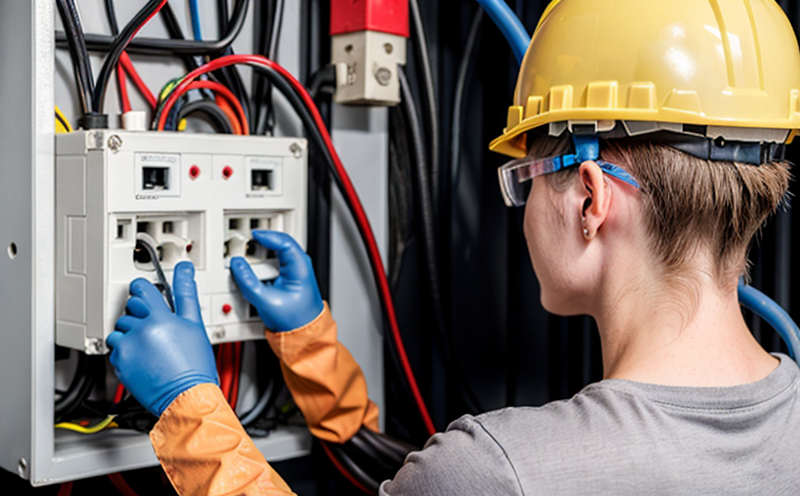ASTM D877 Dielectric Testing of IoT Liquid Insulating Materials
The ASTM D877 standard provides a method for determining the dielectric strength and electrical insulation properties of liquid insulating materials. This test is particularly relevant for smart home and IoT devices that incorporate liquid insulators to ensure their safe and reliable operation.
Smart homes are increasingly integrating advanced technologies into everyday appliances, such as refrigerators, washing machines, and heating systems. These devices often utilize liquid insulating materials within their circuit boards or other critical components to provide insulation against electrical hazards. The dielectric strength of these materials is a crucial factor in ensuring the safety and longevity of these IoT devices.
The ASTM D877 test procedure involves subjecting the specimen to an alternating voltage until breakdown occurs, indicating its dielectric strength. This method helps determine whether the liquid insulating material can withstand electrical stresses without compromising its integrity or causing a short circuit.
For accurate and reliable results, it is essential to prepare the specimens correctly before testing. The process typically involves filling the container with the liquid insulating material, ensuring uniform distribution, and allowing it to settle for an appropriate period to remove air bubbles and other contaminants. Proper preparation ensures consistent test results, which are critical for meeting regulatory requirements.
The equipment used in ASTM D877 testing includes a high-voltage generator capable of producing the specified voltage range, a measuring device for monitoring applied voltage accurately, and a suitable container or vessel to hold the liquid insulating material. The apparatus must be calibrated regularly to ensure precise measurements.
Acceptance criteria under ASTM D877 are based on the dielectric strength value obtained from the test. Specimens that do not meet these criteria may indicate potential safety hazards, necessitating further investigation or replacement of the material used in device manufacturing.
The results of this testing play a vital role in ensuring compliance with international standards such as ASTM D877. Compliance is crucial for manufacturers to avoid legal issues and maintain their reputation in the market. By adhering to these standards, companies can demonstrate their commitment to producing safe and reliable products.
Given the importance of dielectric testing in smart home and IoT devices, it is imperative that laboratories specializing in this area have experienced technicians and state-of-the-art facilities equipped with the latest technology. This ensures accurate and consistent test results, contributing significantly to the quality assurance process.
Applied Standards
The ASTM D877 standard has been widely adopted globally for its rigorous methodology in determining dielectric strength. It is recognized by various regulatory bodies and industries due to its reliability and accuracy.
- American Society for Testing and Materials (ASTM)
- International Organization for Standardization (ISO)
- European Committee for Standardization (CEN)
The standard outlines specific procedures, apparatus requirements, specimen preparation instructions, and acceptance criteria to ensure consistent testing across different laboratories. Compliance with these standards guarantees that the test results are valid and comparable worldwide.
Customer Impact and Satisfaction
By offering ASTM D877 dielectric testing services, our laboratory contributes significantly to enhancing customer satisfaction by ensuring the highest quality of products in smart home and IoT devices. Our expertise in this area helps manufacturers meet stringent regulatory requirements, thereby reducing risks associated with electrical hazards.
Our commitment to delivering accurate and reliable test results fosters trust between us and our clients. We provide detailed reports that include all relevant data from the tests conducted, enabling customers to make informed decisions about their product development processes.
The feedback we receive from satisfied customers highlights several benefits of working with us:
- Comprehensive understanding of ASTM D877 requirements
- Precision and accuracy in testing procedures
- Rigorous adherence to international standards
- Quick turnaround times for test results
- Accessible communication throughout the testing process
Our goal is to exceed expectations by providing exceptional service that meets or exceeds industry benchmarks. Customer satisfaction remains our top priority, and we strive to build long-term relationships based on mutual trust and respect.
Use Cases and Application Examples
| Use Case/Application | Description |
|---|---|
| Smart Refrigerator Insulation | Ensure that the liquid insulating materials used in refrigerators provide adequate electrical insulation to prevent short circuits and ensure safe operation. |
| IoT Washing Machine Components | Determine whether the liquid insulators in washing machines meet the required dielectric strength standards, ensuring their reliability during high-voltage operations. |
| Smart Thermostat Circuit Boards | Evaluate the electrical insulation properties of circuit boards used in smart thermostats to guarantee safe and efficient operation. |
| Wireless Home Security Systems | Test the liquid insulators in wireless home security systems to ensure they can withstand high voltages without compromising their performance or safety. |
- In-home monitoring devices that utilize liquid insulating materials for electrical insulation during data transmission and processing.
- Smart lighting systems with integrated circuit boards and liquid insulators to enhance energy efficiency and reliability.
These applications underscore the importance of ASTM D877 dielectric testing in ensuring the safety, performance, and compliance of smart home IoT devices. By adhering to this standard, manufacturers can mitigate risks associated with electrical hazards and meet regulatory requirements effectively.





